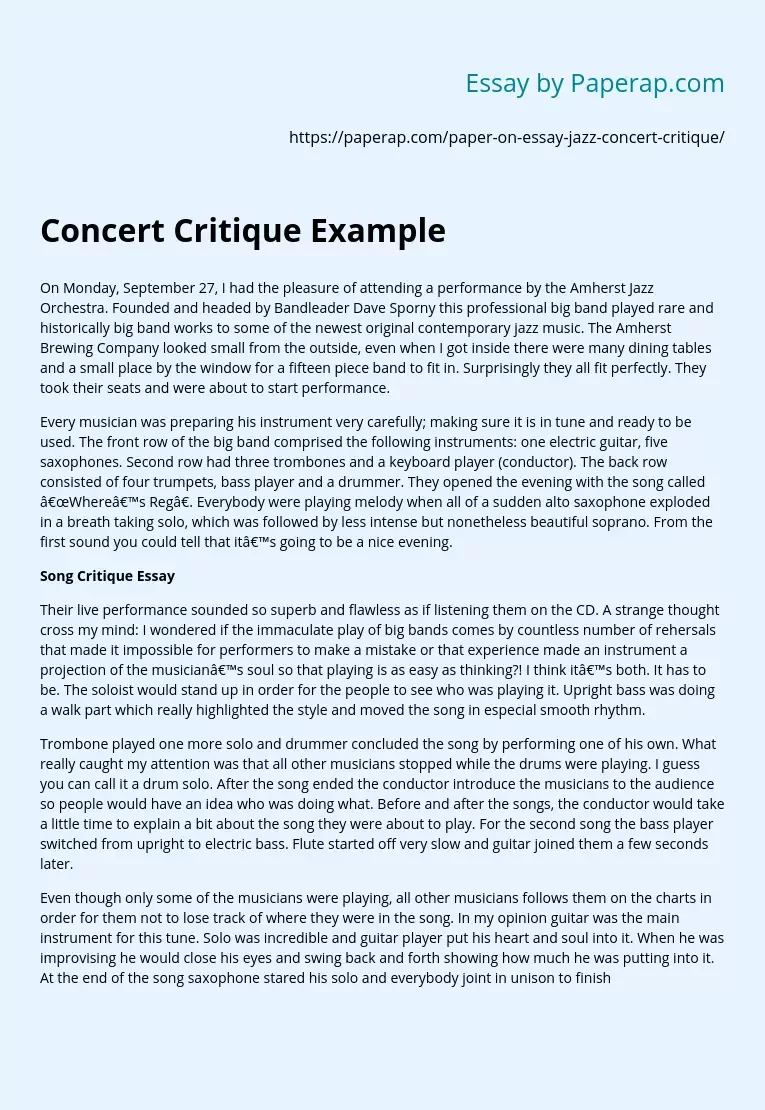On Monday, September 27, I had the pleasure of attending a performance by the Amherst Jazz Orchestra. Founded and headed by Bandleader Dave Sporny this professional big band played rare and historically big band works to some of the newest original contemporary jazz music. The Amherst Brewing Company looked small from the outside, even when I got inside there were many dining tables and a small place by the window for a fifteen piece band to fit in. Surprisingly they all fit perfectly.
They took their seats and were about to start performance.
Every musician was preparing his instrument very carefully; making sure it is in tune and ready to be used. The front row of the big band comprised the following instruments: one electric guitar, five saxophones. Second row had three trombones and a keyboard player (conductor). The back row consisted of four trumpets, bass player and a drummer. They opened the evening with the song called “Where’s Reg”. Everybody were playing melody when all of a sudden alto saxophone exploded in a breath taking solo, which was followed by less intense but nonetheless beautiful soprano.
From the first sound you could tell that it’s going to be a nice evening.
Song Critique Essay
Their live performance sounded so superb and flawless as if listening them on the CD. A strange thought cross my mind: I wondered if the immaculate play of big bands comes by countless number of rehersals that made it impossible for performers to make a mistake or that experience made an instrument a projection of the musician’s soul so that playing is as easy as thinking?! I think it’s both.
It has to be. The soloist would stand up in order for the people to see who was playing it. Upright bass was doing a walk part which really highlighted the style and moved the song in especial smooth rhythm.
Trombone played one more solo and drummer concluded the song by performing one of his own. What really caught my attention was that all other musicians stopped while the drums were playing. I guess you can call it a drum solo. After the song ended the conductor introduce the musicians to the audience so people would have an idea who was doing what. Before and after the songs, the conductor would take a little time to explain a bit about the song they were about to play. For the second song the bass player switched from upright to electric bass. Flute started off very slow and guitar joined them a few seconds later.
Even though only some of the musicians were playing, all other musicians follows them on the charts in order for them not to lose track of where they were in the song. In my opinion guitar was the main instrument for this tune. Solo was incredible and guitar player put his heart and soul into it. When he was improvising he would close his eyes and swing back and forth showing how much he was putting into it. At the end of the song saxophone stared his solo and everybody joint in unison to finish it off. Conductor showed the sign that marked the end and music stopped.
In my opinion it’s a weird place for the conductor to conduct standing in the second row. The saxophonists had to turn their heads or look right behind them in order to see what signs he was showing. Usually conductors stand at the front of the band, but lack of space at the front forced him to stand where he was. “Still crazy after all this years” was a slow melody. The song started with clarinet. I noticed that the saxophonists would switch from one instrument to another, different sax, clarinet, flute was the part of their job. Trumpets put on the mutes for smoother sound.
Some musicians were young guys probably students that have reached the level to play professional stuff like this. Saxophone played a solo, then guitar and back to the saxophone solo. In my opinion three clarinets and muted trumpets in the fourth song sounded the best. It was my favorite song for the night. They started off with the bass at the beginning and slowly built up through the end of the song. Trumpet played a solo in the middle of the song with guitar accompaniment. Guitar would change chords slowly while trumpet poured his heart out. And at the end of it flute player just blew my mind away with the speed he played.
The fifth song they played had an awkward beginning. The whole band started playing at the once. It sounded like the different parts of a thunder storm. And all played upbeat rhythm and catchy melody. It sounded very unique and I bet it caught people’s attention even if they didn’t come to see the band playing. You don’t hear this kind of a beginning on the radio. It was cool! When two saxophone players were soloing I noticed elements of call and respond in their play. For the last three songs conductor introduced a female vocalist that sang beautifully. The first song she sang sounded very old and reminded me a swing era of jazz music.
Bass player picked up his upright bass. Every time vocalist stopped singing, trumpet played solo. “Something got a hold on me” was the last song and was really a dance like song in a boogie woogie style. Vocalist sang the beginning very slow almost with no music in the background and then it just went flying with upbeat melody. Saxophone played solo and then piano right after it, leaving that jazzy feeling in you for the rest of the night and made a lasting impression upon myself. All together it was only eight nicely done songs, but let me tell you, one and a half hour just flew by when I listened to these guys!
Concert Critique Example. (2019, Dec 05). Retrieved from https://paperap.com/paper-on-essay-jazz-concert-critique/

